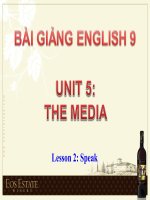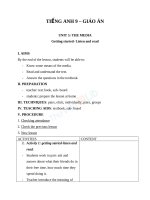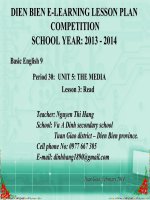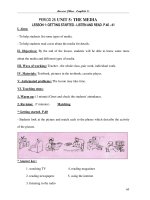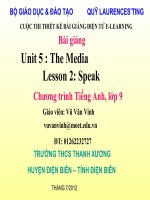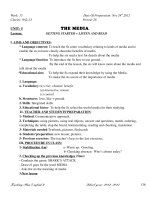Giáo án Tiếng Anh 9 Unit 5: The media
Bạn đang xem bản rút gọn của tài liệu. Xem và tải ngay bản đầy đủ của tài liệu tại đây (170.17 KB, 19 trang )
Giáo án Tiếng Anh 9
UNIT 5: THE MEDIA
Lesson 1: Getting started – Listen and Read (45 min)
I. Objectives:
At the end of the lesson, students are able to talk about the media as well as to know
something about the development of means of communication.
II. Language contents:
1.
Vocabulary: Words refer to the media “town crier – interactive TV –
the latest news information – remote controls”
2.
Grammar: Gerund after some verbs
III. Techniques:
Miming; Pair / Group work; Question – Answers.
IV. Teaching aids:
Cassette recorder; tape; illustrating pictures; visual aids; Flash cards; colored chalk’
student’s book
V. Time: 45 minutes
VI. Teaching procedures:
Steps
Warm-up
(7’)
Activities
Miming: Ss are divided into 5 groups
- The leader/ volunteer of each group gets 1 card from the teacher then
mimes the activity the he/ she gets from the card.
- The others of the group guess and say the name of the activity. Then
they write the name of the activity on the board. (If the members of the
group cannot say the name of the activity, the rest of the class can join the
game).
Presentation
(18’)
- Teacher elicits to the topic of the lesson by using the groups of words
written on the blackboard.
1
- Pair work: Students listen to the tape (1st times) and check the table
(books closed).
Listen and check the appropriate paragraph (A, B, C, D)
A
B
C
D
Television
The latest news
Newspapers & magazines
Interactive TV
Town criers
Remotes controls
- Students listen to the tape (2nd times) and check the answers.
-
Students read the text silently and complete the table (p.41)
-
Teacher checks the student’s answers and explains new words if
necessary. (Students listen & take notes).
Practice
-
Group work:
(12’)
-
Students ask & answer the questions (p.42)
-
Teacher checks the student’s answers. Then students write the
answer in their exercise books.
-
Students ask & answer the questions about their favorite activities
in their free time, the benefits of these actives (if they know) and
how much time they often spend on each activity.
Consolidation
-
Teacher gives some advices if necessary.
-
Students summarize the development of the media, using works /
(5’)
Homework (3’)
groups of works / statements on the board.
-
Read the text again and learn the vocabulary by heart.
-
Write some TV programs in your exercise books. Which programs
do you like best? Why?
UNIT 5: MEDIA
Lesson: Speak (45 min)
I. Objectives:
2
By the end of the lesson, sts will be able to talk to their friends about the T.V
programs that they like or dislike.
II. Teaching aids:
A4 papers, tape
III. Teaching procedure:
Steps
Warm up
Activates
Let sts listen to some introductory music and ask them to say in which TV
programs these music playing cartoon, folk music, show game, …
Pre-speaking
Let sts listen to some introductory music and ask them to say in which TV
programs these music playing cartoon, folk music, show game, …
-
Ask sts some questions about the TV programs they like best.
-
Have some Sts Read the dialogue in pairs before class check their
pronunciation / intonation of TAG question.
-
Let sts work in pairs to practice the dialogue.
-
Have sts pick out sentences showing agreement and disagreement and
ask them to practice.
a. Agree:
•
I prefer documentaries.
•
I love watching sports.
•
I enjoy it too.
b. Disagree:
While-speaking
•
Not really
•
I don’t like watching sports.
•
I’m the opposite.
Documentaries seem quite boring to me.
Have sts talk each other about the TV programs they like or dislike
(making similar dialogue).
Post-speaking
- Have sts copy down this table (work in group).
News
MAI
v
TUẤN
x
THÁI
…
3
Movies
x
v
Music
x
v
Sports
v
x
Game show
v
v
Cartoon
v
x
Get sts to ask and answer question about TV programs that
people in their group like and dislike, using TAG question.
Homework
Have sts find out the most and the least favorite TV programs of
their group.
Have sts rewrite the dialogue they made (while doing pairwork) in their notebooks.
4
UNIT 5: THE MEDIA
Lesson 3: Listen (45 min)
I. Objectives:
Developing listening skill: listen and complete a table. By the end of the lesson,
students know the important dates of the media.
II. Language content:
1. Vocabulary:
- Assignment (n)
- Telegraph (n)
- Newsreel (n)
2. Grammar:
- Simple past tense
III. Teaching aids: cassette recorder and tape, handout (for exercise)
IV. Teaching procedures:
Steps
Warm up
3’
Pre-listening
7’
-
Teacher’s guiding activates
Teacher’s asks students to give some means of media, and then
write on the board.
-
Suggesting: newspaper, radio, television, internet, etc.
-
Teacher shows a telegraph and says: besides newspaper,
television… there are other means of media such as: telegraph,
newsreel, etc (teacher explains these words).
-
Teacher asks students if they know when the telegraph was
invented.
While listening
18’
-
Teacher introduces the conversation between Chau and her father
about her assignment (a test)
-
Teacher asks students top pay attention to the dates when listening
to the tape.
5
-
Students listen for the 1st time.
-
Students listen again and complete these information in the table
(group work)
-
Students listen for the last time to check the answers. (The groups
exchange the answers for correction).
Post listening
15’
-
Teachers asks some students (leaders of the groups) to stick the
answer on the board.
-
Teacher corrects the mistakes and gives the right answers.
-
Teacher gives them points and congratulates the swimming group.
-
Matching exercise:
Dates
a. The 8th century AD.
Means of media
1. Television
b. Between the 7th and 8th.
2. telegraph
c. Early in 19st century.
3. internet
d. Late 19st century.
4. radio and newsreels
e. Early in 20st century.
5. First printed newspaper.
f. In 1940s.
g. In 1950s.
h. Early 1990
i. Late 1990.
(group work)
j. Mid and late 1990.
k. Late 20st century.
- Teacher gives feedback.
Homework
2’
-
Students have to get information about the internet: “What do they
use the internet for?”
6
UNIT 5: THE MEDIA
Lesson 4:
Section:
- Read (page 43-44)
Period 31:
Aim
Reading a text about the internet.
Objective
By the end of the lesson, students will get some knowledge about the internet.
Teaching aids
Text books, posters, pictures.
Stage
Steps/Activities
Word
arrangemen
t
Warm – up
* Charting:
- Show a picture of a computer and ask students about it.
•
What’s this?
•
Can you use computers?
•
What subject help you to use computers?
•
Have you ever used Internet?
•
Do you find the Internet useful?
•
What do you use the Internet for?
I. Pre-teach vocabulary
-
Forum (n): diễn đàn
-
(translation)
-
Sift (v): lướt sóng, lướt mạng Internet
-
(translation)
-
Deny (v): từ chối, phủ nhận
-
(synonym : refuse)
-
Get access to: tiếp cận.
7
-
Limitation (n): sự giới, hạn chế
-
Spam (n): thư rác
-
(translation)
-
Alert (adj): tỉnh táo, nhanh trí, cảnh giác.
-
(definition: quick in movement of the body or
mind)
-
Wander (v): đi lang thang
-
(definition: move or go around without any
purpose or destination)
* Checking vocabulary Matching:
-
Write the new words in the list on the left hand
side of the blackboard.
-
Write the translations on the right hand side of
the blackboard.
-
Have student’s com to the blackboard to match
items on the left with those on the right by driving a
line connecting them.
II. True – false stamens prediction
Set the science: There is a forum on the Internet. You will read
some opinions about the advantages and disadvantages of the
Internet.
-
Ask students to read the stamens (on poster) and
word in pairs to predict they are true or false.
True – False statements
a.
Internet is a wonderful invention of modern life
b.
The internet is available not only in cities but
also in the countryside.
c.
People use the Internet for two purposes:
education and entertainment.
d.
Bad program is one of the limitations of the
Internet
8
e.
You should be alert when using the internet.
- Give feedback
While
Individuate
work
I. Reading and checking prediction:
-
reading
Have students read the text on page 43, 44 and
check their predictions. Then ask them to correct the
false stamens.
-
Give feedback and correct.
* Answer keys:
a.
T
b.
F
c.
F
d.
T
e.
T
* Corrections:
a. The Internet is availed only in cities.
b. People use the Internet for many purposes: education,
information, communication, commerce, entertainment.
Pair work
II. Guessing meaning of the words. Ask students to work in
pairs to guess the meanings of the works.
- Get students to match the English words in column A with
their meaning in column B.
A
B
a. increase
1. khám phá
b. convenient
2. sự rủi ro
c. explore
3. tăng lên
d. risk
4. thư rác điện tử
e. electronic junk mail
5. tiện lợi
f. time – consuming
6. mất nhiều thời gian
* Answer keys:
a-3
b-5
c–1
d–2
e–4
f–6
9
III. Comperhension questions:
-
Have students read the text again and answer the
questions on page 44.
-
Get students to work in pairs, practicing asking
and answering.
-
Call on some students to call out their answers.
-
Give feedback and correct.
* Answer keys:
1. What does Sandra use the Internet to get information and to
communicate with friends and relatives?
2. Why is it uneasy for Honghoa to get access to the Internet?
- Because she lives in the countryside where the Internet is
unavailable.
3. According to Huansui, why do people use the Internet?
- People use the Internet for education, communication,
commerce and entertainment.
4. Make a list of benefits of the Internet according to the three
responses.
-Benefits:
•
Fast and convenient way to get information.
•
Communication
•
Education
•
Entertainment
•
Commerce
5. Are there any disadvantages of the Internet? If so. What are
they?
Yes. There are some disadvantages.
•
Time-consuming.
•
Costly
•
Dangerous because of virus\s and bad programs.
•
Spam/electronic jock mail.
Pair work
10
•
Personal information leaking.
-
Have student work in pairs, practice asking and
Group work
answering.
Production
* Discussion:
-
Divide the class in to four teams.
-
Give them the questions and ask them to discuss
in groups.
Homework
“Do you agree or disagree with the response? What is your
Individuate
work
response to this forum?”
- Get students to write their responses in their notebooks.
11
UNIT 5: THE MEDIA
Lesson 4: Write (45 min)
I. Objectives:
- By the end of the lesson, students will be able to express their ideas about a certain
problem in their writing.
- Develop speaking and writing skills
II. Language contents:
1. Grammar: review: present simple tense and modal verb CAN
2. Vocabulary: words related to the new topic “The Internet”
III. Techniques:
- Question – answer (communicative approach)
- Brainstorming.
- Eliciting.
IV. Teaching aids:
- Blackboard and chalk.
- Pictures, flash cards.
- Sheers of paper, pens.
V. Time: 45 minutes.
VI. Procedures:
Steps
Activities
•
Warm up:
- T hands out some picture articles… to the sts. Sts will take their turns to look
ask them.
- T ask: “Do you know where I got these?” On the Internet.
•
Preparation:
- T introduces these pictures/articles … are for:
+ information
12
+ entertainment
Pre-writing
20’
+ education
- T points out the benefits of the Internet. (That means we can get many things
we need on the internet)
- T asks sts to read the reading text (5.Read) again and discuss in groups to
give more ideas about the three main contents on the internet.
- T asks to go to the blackboard and write their sentences.
* Information:
+ We can check weather conditions before we go on a pick nick or we can
book the tickets, find time tables and maps foot the trip reserve rooms in a
hotel …
* Entertainment:
+ We can listen to music or radio, watch films or play games…
+ We can communicate with our friends or relatives by means of e-mail or
chatting …
* Education:
+ We can teach ourselves. We can look up the new words…
- Sts are divided into 3 groups.
- T hands out some sheets of paper, asking sts to write a passage about the
benefits of the internet, using the cues in their text books (p44)
While-writing
17’
Information
New, articles,
Entertainment
Music, movies, games,
Education
On-line school, on-
weather
chatting, e-mail, web
line lessons, self-
forecast
cam…
- T sticks their tasks on the blackboard.
study, ...
- T invites representatives of each group to read their passages in front of the
class.
- T takes one of their tasks and corrects the mistakes, the others will be
corrected at home by the teacher (notice the use of simple present tense)
- Sts exchange their tasks for comparison.
Post – writing
- T gives conclusion:
13
(8’)
“We can use the Internet for many purposes. It is really a wonderful invention
of our modern life. But be alert while enjoying surfing.”
- T asks some questions:
1. What do you have to do before having a picnic or a trip?
2. How can you communicate with your friends or relatives on the fastest
way?
3. Do you usually listen to music/radio on the internet?
4. Do you usually chat with someone on the internet?
………
- And the last question: “What do you usually do on the internet?”
- T asks sts to ask and answer the question => make a deep impression on their
minds about what they have studied.
Homework
- Write down in your notebooks a passage about the benefits of the internet.
14
UNIT 5: THE MEDIA
Lesson 6:
Section: - Language Focus 3-4 (page 46)
Period 33:
Aim
Further Practice on using gerunds after some verbs.
Objective
By the end of the lesson, students will be able to talk to their friends about their likes
or dislikes.
Teaching aids
Text books, posters.
PROCEDURE
Stage
Warm-up
Steps/Activities
Word
arrangement
Whole class
* Word square:
L
M P
R
A
I
O M
I
S
K
I
R
L
S
E
N J
O
Y
A
F V
S
V
F
I
S
V
O
I
N U
U
T
N
I
G
Y
N
I
S G
E
S
S
H B
C
D
- Stick the poster on the board.
C
S
T
L
U
R
S
E
T
E
T
D
C
O
N
S
I
D
E
R
I
N
C
V
A
V
O
I
D
O
S
I
K
E
K
I
L
S
I
D
E
M
B
O
N
M
L
H
I
U
- Ask students to find out 13 verbs in the word square.
- Divide the class into two teams, students from each team go to
the board and circle the words they have found, and then write
them down in the column of their team.
- The team which has more right words will be win the game.
* Answer keys:
Like, consider, finish, avoid
15
Love, enjoy, miss, pat ice
Deny, mind
Suggest, finish
Dislike
* Dialogue Build:
Set The Science: Hoa and Lan are talking about their favorites in
their free time.
- Show the open dialogue and ask students to build a complete
dialogue.
Lan:
(1)
Hoa: No, I
Lan:
Presentation
Lan:
(4)
(5)
Hoa: Yes, I
(9)
(2)
You
(3)
soccer?
it.
(6)
(8)
You
Hoa: I don’t know. I’ve
(7)
enjoy
TV?
it.
(10)
(11)
finish?
tiered
(12)
Whole class
* Answer keys:
(1) do
(2) like
(3) playing
(4) hate
(5) do
(6) you
(7) Watching
(8) Love
(9) do
(10) Enjoy
(11) never
(12) it
* Revision of Gerunds After Some Verbs
* Form:
16
Like
Love
Enjoy
+ V-ing (Gerund)
Dislike
Hate
Teacher can remind some other verbs
Mind
Finish
Suggest
Consider
Deny
Keep on (continue)
Miss
Can’t help
Practice
Stand (bear)
- Get student to do exercise 3 on page 46
- Have students ask and answer questions about each item in the
box.
Soccer
fishing
movies
Detective stories
Candy
Music
- Give an example.
Practice
Pair work
a. Soccer:
- Do you like playing soccer?
- Yes, I do.
- Call on some pairs of students to practice asking and answering.
- Give feedback and correction.
b. Fishing:
- Do you enjoy fishing?
- No, I hate it.
c. Movies:
17
- Do you love going to the movies?
- Yes, I love it.
d. Detective stories:
- Do you like reading detective stories?
Pair work
- I don’t know. I’ve never read them.
e. Candy
- Do you love eating candy?
- Yes, I like it. Especially chocolates.
f. Music
- Do you love listening music?
- Yes, I love it. Especially pop music.
- Have students work in pairs to ask and answer questions.
* Writing: (substitution box)
- Have students write true sentences about their family members,
relatives, friends and themsevelves.
- Ask students to look at the works in the three box on the page
46 and use them as cues.
Production
- Give example
Invidual
My father likes watching sports but my mother doesn’t. She
work
loves listening to music.
- Ask some students to read then write their sentences on the
board.
- Give feedback and correction.
- Get students to continue to write individually.
a. My mother hates advertisements on TV but little brother
doesn’t, he loves it very much.
b. I like writing letters to my friends but my sister doesn’t. She
hates writing.
- Ask student to write some sentences about their friends, using
like, love, enjoy … + V-ing.
18
Home work
19

